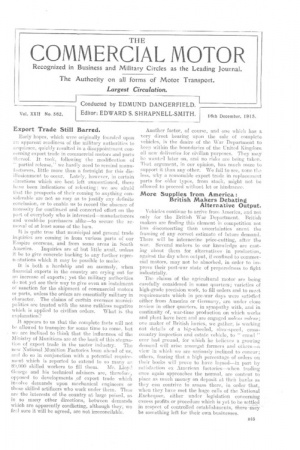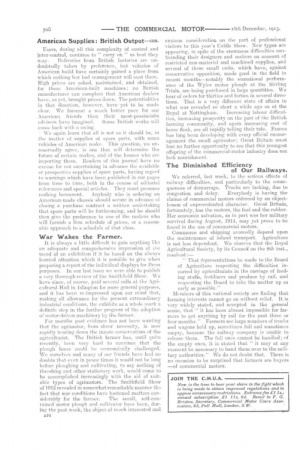Export Trade Still Barred.
Page 1

Page 2

If you've noticed an error in this article please click here to report it so we can fix it.
Early hopes, which were originally founded upon an apparent readiness of the military authorities to acquiesce, quickly resulted in a disappointment concerning export trade in commercial motors and parts thereof, it took, following the modification of partial release, ' we hardly need to remind manufaeturers, little more than a fortnight for this disillusionment to occur. Lately, however, in certain directions which are best left unmentioned, there have been indications of relenting: we are afraid. that the prospects of their corning to anything considerable are not so rosy as to justify any definite conclusion, or to enable us to record the absence of necessity for continued arid concerted effort on the part of everybody who is interested—manufacturers and would-be purchasers alike—to 'secure the removal of at least some of the bars.
ft is quite true that municipal and general trade inquiries are corning in from various parts of our Empire overseas, and from some areas in South America. Inquiries are of but little avail, unless it be to give concrete backing to any further representations which it may be possible to make.
It is both a hardship and an anomaly, when financial experts in the country are crying out for an increase of exports; yet the military authorities do not yet see their way to give, even an instalment of sanction for the shipment of commercial motors or parts, unless the orders are essentially .military in character. The claims of certain over-Seas municipalities are treated with the same ruthless negative which is applied to civilian orders. What is the ON planation ?
It appears to us that the complete facts will not be allowed to transpire for some time to come, but we are inclined to think that the influences of the Ministry of Munitions are at the back of this stagna tion of export trade in the .motor industry. The new National Munition Factories loom ahead of us, and do so in conjunction with a potential require.. meat which is reported to extend to so many ae 80.000 skilled workers to fill them. Mr, LloyCl George and his technical advisers are, therefor,, opposed to developments _of export trade which involve demands upon mechanical engineers or those skilled artificers who work under them. Thus are the interests of the country at large poised, as in so many other directions, between demands which are apparently conflicting, although they; we feel sure it will be agreed, arc not irreconcilable. Another factor, of course, and one which has a very direct bearing upon the sale of complete vehicles, is the desire of the War Department to keep within the boundaries of the United Kingdom all new deliveries for civilian purposes. They may be wanted. later on, and no risks are being taken. That argument, in our opinion, has much more to support it than any other. We fail to see, none the less, why a reasonable export trade in replacement parts for older types, from stock, might not be allowed to proceed without let or hindrance.
More Supplies from America : British Makers Debating Alternative Output.
• Vehicles continue to arrive from America, and not only for the British War Department. British makers are finding this element in competition not less disconcerting than uncertainties anent the framing of any correct estimate of future demand. There will be internecine price-cutting, after the war. Several makers to our knowledge are casting about them for. alternatives • in production, against the day when output, if confined to commercial motors, may not be absorbed, in. order to improve their post-War state of preparedness to fight industrially.
The claims of the agricultural motor are being carefully considered in some quarters; varieties of high-grade precision work, to fill orders and to meet requirements which in pre-war days were satisfied. either from America or Germany, are under close review in other quarters, in sympathy with, and in continuity of, war-time production on which works and plant have been end are engaged nolens yarns; one maker of British lorries, we gather, is working out details of a big-wheeled, slow-speed, crosscountry inspection and estate vehicle, to " crawl " over had ground, for which he believes a growing demand will arise amongst farmers and others—a, view in which we are seriously inclined to concur ; others, fearing that a high percentage of orders on their books will prove to have lapsed—in part by satisfaction ex American factories—when trading once again approaches the normal, are content to place as much money on deposit, at their banks as they can contrive to amass there, in order that, when they have met the huge calls of the National Exchequer, either under legislation concerning excess profits or procedure which is yet to be settled in respect of controlled establishments, -the-may be something left for their own businesses.
American Supplies: British Output—con.
Users, during all this complexity of control and inter-control, continue to " carry on " as best they -nay. Deliveries from British factories are undoubtedly taken by preference, but vehicles of American build have certainly gained a place from which nothing but bad management will oust them. High prices are asked, maintained, and obtained, for these American-built machines; no British Manufacturer can complain that American dealers have, as yet, brought prices down. The potentialities in that direction, however, have •yet to be made clear. We forecast a much hotter pace for our American friends than their most-pessimistic advisers have imagined. Some British works will come back with a swing.
We again learn that all is not as it should be; in the Matter of supplies of spare parts, with some vehicles -of American make. This question, we unreservedly agree, is one that Will determine the future of certain makes; and of the houses who are importing them.Readersof this journal have no excuse for not ascertaining in advance the available or prospective supplies of spare parts, having regard to warnings which have been published in our pages from time to time, both in the course of editorial references and special articles. They must presume nothing hereanent. Anybody who is ordering an American-made chassis should secure in advance of closing a purchase contract a written undertaking that spare parts will be forthcoming, and he should then .give the preference to one of the makers who will furnish a firm schedule of prices, or a reasonable approach to a schedule of that class.
War Wakes the Farmer.
It is always a little difficult to gain anything like an adequate and comprehensive impression of the trend of an exhibition if it be based on the always hurried attention which it is possible to give when preparing a report of the individual displa.ys for Press purposes. In our last issue we were able to publish a very thorough review of the Smithfield Show. We have since, of course, paid several calls at the Agricultural Hall in Islington for more general purposes, and it has been re-impressed upon our mind that, making all allowance for the present extraordinary industrial conditions, the exhibits as a whole mark a definite step in the further progress of the adoption Of motor-driven machinery by the farmer.
For months past evidence has not been wanting that the agrimotor, from sheer necessity, is now rapidly heating down the innate conservatism of the agriculturist. The British farmer has, until quite recently, • been v hard to convince that the plough horse could he economically challenged. We ourSelves and many of our friends have had no doubts that even in peace times it would not be long before ploughing and cultivating, to say nothing of threshing and other stationary work, would come to be accomplished increasingly with the aid of suitable types of agrimotorS. The Smithfield Show of 1915 revealed in somewhat 'remarkable manner the fact that War conditions have hastened matters con Siderably for the farmer'. The small, self-contained 'motor plough and cultivator have been, during the past weai-the object of much interested and .B16' anxious consideration on the part of professional visitors to this year's Cattle Show. New types are appearing, in spite of the enormous difficulties confounding their designers and makers on account of restricted raw-material and machined supplies, and several of these small units, which have, against conservative opposition, made good in the field in recent months—notably the sensational performance of the Wyles motor plough at the Stirling Trials, are being purchased in large quantities. We hear of orders for thirties-and forties in several directions. That is a very different state of affairs to what was revealed soshort a while ago as at the Royal at Nottingham. Increasing labour difficulties, increasing prosperity on the' part of the British farming community, and again increasing cost of horse flesh, are all rapidly telling their tale. France has long been developing with every official encouragement the small agrimotor.; Great Britain must lose no further opportunity to see that this youngest offspring of the commercial-motor industry does not lack nourishment.
The Diminished Efficiency of Our Railways.
We referred, last week, to the serious effects of railway difficulties, and particularly to the consequences of demurrage. Trucks are lacking, due to congestion and delay. Everybody is having the claims of commercial motors enforced by an objectlesson of unprecedented character. Great Britain, fortunately, has the motors, the fuel and the rubber. Her economic salvation, as in part was her military survival during August, 1914, may yet prove to be found in the use of commercial motors.
Commerce and shipping avowedly depend upon the maintenance of inland transport. Agriculture is not less dependent. We observe that the Royal Agricultural Society, by its Council on the 8th inst., resolved:— " That fepresentations be made to the Board of Agriculture respecting the difficulties incurred by agriculturists in the carriage of feeding stuffs, fertilisers and produce by rail, and requesting the Board to take the matter up as early as possible."
Members of this national society. are finding that farming interests cannot go on without relief. it is very widely stated, and accepted in the. general sense, that " it has been almost impossible for farmers to get anything by rail for the past three or four months." Farmers see large numbers of trucks and wagons held up, sometimes full and sometimes empty, because the railway company is unable to release them. The full ones cannot be handled; of the empty ones, it is stated that " it may at any moment be necessary to hand them over to the military authorities." We do not doubt that. There is no occasion to be surprised that farmers are buyers —of commercial motors_




















